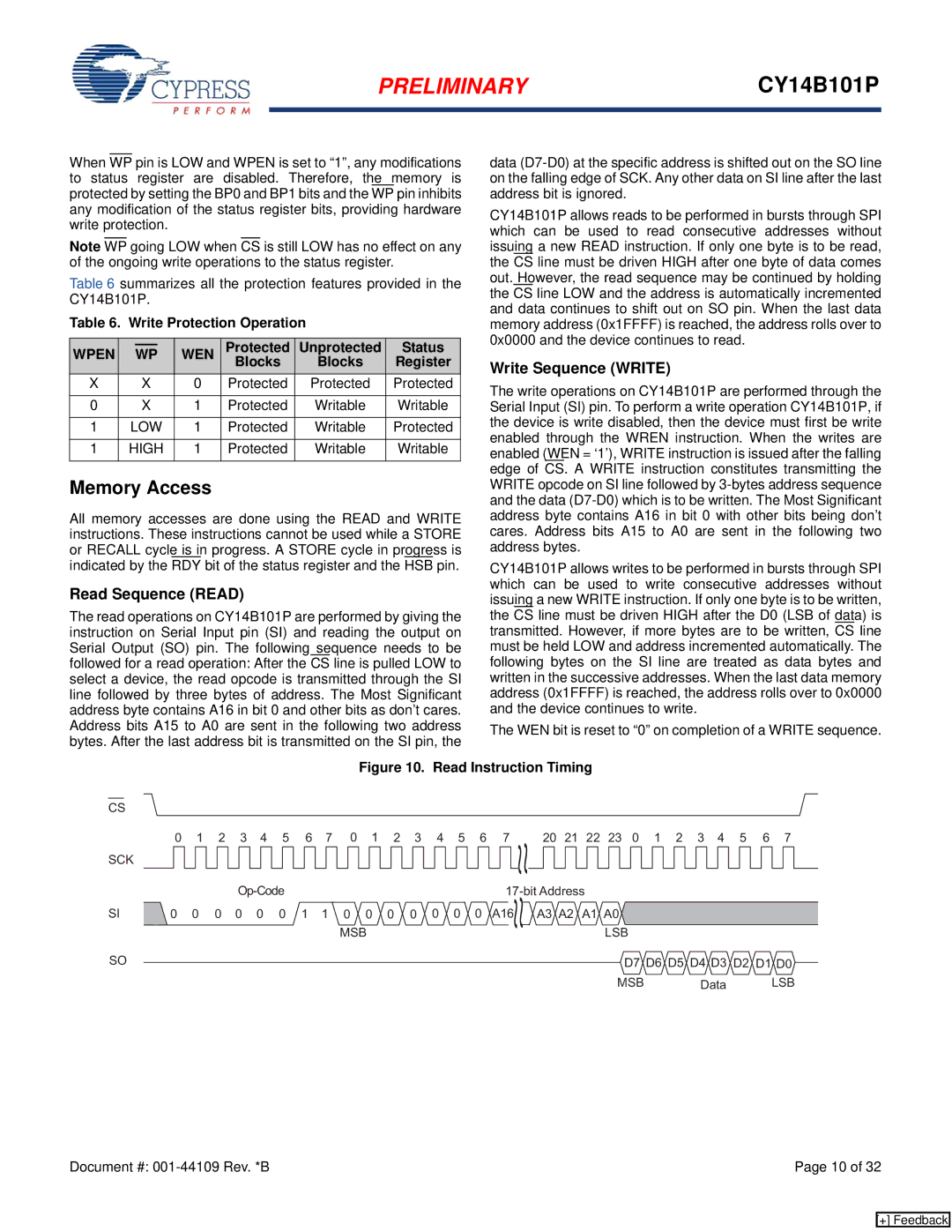
PRELIMINARYCY14B101P
When WP pin is LOW and WPEN is set to “1”, any modifications to status register are disabled. Therefore, the memory is protected by setting the BP0 and BP1 bits and the WP pin inhibits any modification of the status register bits, providing hardware write protection.
Note WP going LOW when CS is still LOW has no effect on any of the ongoing write operations to the status register.
Table 6 summarizes all the protection features provided in the CY14B101P.
Table 6. Write Protection Operation
WPEN |
|
|
| WEN | Protected | Unprotected | Status |
| WP | ||||||
|
|
|
|
| Blocks | Blocks | Register |
X |
| X | 0 | Protected | Protected | Protected | |
|
|
|
|
|
|
| |
0 |
| X | 1 | Protected | Writable | Writable | |
|
|
|
|
|
| ||
1 | LOW | 1 | Protected | Writable | Protected | ||
|
|
|
|
|
| ||
1 | HIGH | 1 | Protected | Writable | Writable | ||
|
|
|
|
|
|
|
|
Memory Access
All memory accesses are done using the READ and WRITE instructions. These instructions cannot be used while a STORE or RECALL cycle is in progress. A STORE cycle in progress is indicated by the RDY bit of the status register and the HSB pin.
Read Sequence (READ)
The read operations on CY14B101P are performed by giving the instruction on Serial Input pin (SI) and reading the output on Serial Output (SO) pin. The following sequence needs to be followed for a read operation: After the CS line is pulled LOW to select a device, the read opcode is transmitted through the SI line followed by three bytes of address. The Most Significant address byte contains A16 in bit 0 and other bits as don’t cares. Address bits A15 to A0 are sent in the following two address bytes. After the last address bit is transmitted on the SI pin, the
data
CY14B101P allows reads to be performed in bursts through SPI which can be used to read consecutive addresses without issuing a new READ instruction. If only one byte is to be read, the CS line must be driven HIGH after one byte of data comes out. However, the read sequence may be continued by holding the CS line LOW and the address is automatically incremented and data continues to shift out on SO pin. When the last data memory address (0x1FFFF) is reached, the address rolls over to 0x0000 and the device continues to read.
Write Sequence (WRITE)
The write operations on CY14B101P are performed through the Serial Input (SI) pin. To perform a write operation CY14B101P, if the device is write disabled, then the device must first be write enabled through the WREN instruction. When the writes are enabled (WEN = ‘1’), WRITE instruction is issued after the falling edge of CS. A WRITE instruction constitutes transmitting the WRITE opcode on SI line followed by
CY14B101P allows writes to be performed in bursts through SPI which can be used to write consecutive addresses without issuing a new WRITE instruction. If only one byte is to be written, the CS line must be driven HIGH after the D0 (LSB of data) is transmitted. However, if more bytes are to be written, CS line must be held LOW and address incremented automatically. The following bytes on the SI line are treated as data bytes and written in the successive addresses. When the last data memory address (0x1FFFF) is reached, the address rolls over to 0x0000 and the device continues to write.
The WEN bit is reset to “0” on completion of a WRITE sequence.
Figure 10. Read Instruction Timing
CS
SCK
SI
SO
0 | 1 | 2 | 3 | 4 | 5 | 6 | 7 | 0 | 1 | 2 | 3 | 4 | 5 | 6 | 7 | 20 | 21 | 22 | 23 | 0 | 1 | 2 | 3 | 4 | 5 | 6 | 7 |
|
|
|
|
|
|
|
|
|
|
|
|
|
|
| ~~ |
|
|
|
|
|
|
|
|
|
|
|
|
|
|
|
|
|
|
|
|
|
|
|
|
|
|
|
|
|
|
|
|
| |||||||
0 | 0 | 0 | 0 | 0 | 0 | 1 | 1 | 0 | 0 | 0 | 0 | 0 | 0 | 0 | A16 | A3 A2 | A1 | A0 |
|
|
|
|
|
|
|
| |
|
|
|
|
|
|
|
| MSB |
|
|
|
|
| ~~ |
|
|
| LSB |
|
|
|
|
|
|
| ||
|
|
|
|
|
|
|
|
|
|
|
|
|
|
|
|
|
|
|
|
|
|
|
| ||||
|
|
|
|
|
|
|
|
|
|
|
|
|
|
|
|
|
|
|
| D7 D6 D5 D4 D3 | D2 D1 D0 | ||||||
|
|
|
|
|
|
|
|
|
|
|
|
|
|
|
|
|
|
| MSB |
|
| Data |
|
| LSB | ||
Document #: | Page 10 of 32 |
[+] Feedback
